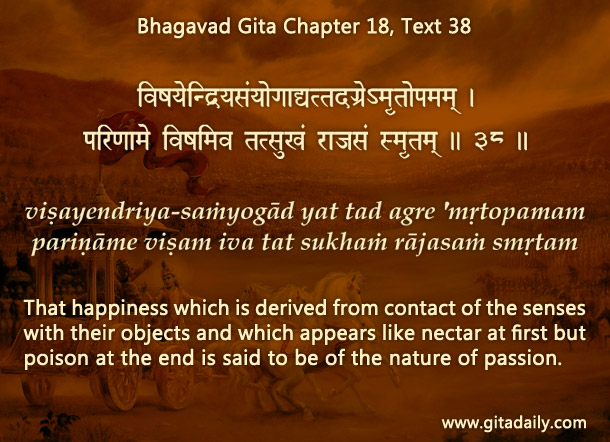When the mind believes something is enjoyable it stops evaluating whether it is actually enjoyable
Our mind often works like a programmed device, giving particular responses to particular stimuli. Some of this programming protects us from pain. For example, if we touch something hot, our mind impels us to move away from it, even before we consciously think about what is happening.
While some such programming works for us, it mostly works against us. Prominent among such harmful programs are our mind’s beliefs about pleasure. When the mind believes that something is enjoyable, it pushes us toward that object, even without our conscious intention – and even when such indulgence hurts us.
Consider alcoholics. Their mind has a deep-rooted belief that alcohol is life’s greatest enjoyment. Driven by this belief, they drink, even if they have resolved not to. After such drinking binges, even if they get brief highs, they also get long hangovers. Over time, the highs start getting shorter and the hangovers start getting worse. Drinking gives them far more trouble than pleasure.
Our mind may believe that indulgences such as over-eating, over-sleeping or indiscriminate net surfing are enjoyable, but are they, really? Do they leave us feeling contented and fulfilled? Rarely, if ever. Thus, experience demonstrates that our mind’s beliefs about material pleasures are false. Yet we tragically choose to trust our mind’s beliefs rather than our own experiences.
To protect ourselves, we need to counter our blind faith in our mind. How? By studying Gita wisdom regularly. Helping us see beyond the initial appearances that the mind sees, the Bhagavad-gita (18.38) states that sensual pleasures feel delightful initially, but painful eventually.
Guided by the Gita, when we conscientiously practice bhakti-yoga, we start accessing lasting happiness. And such sublime experiences gradually change our mind’s beliefs about happiness, till those beliefs align with eternal spiritual realities.
Think it over:
- How does our mind’s programming sometimes work against us?
- How can we understand that our mind’s beliefs about material pleasures are false?
- How can we counter our blind faith in our mind?
***
18.38 That happiness which is derived from contact of the senses with their objects and which appears like nectar at first but poison at the end is said to be of the nature of passion.

To know more about this verse, please click on the image
Explanation of article:
https://www.youtube.com/watch?v=uDqMMeXHA-Q
Podcast:



Leave A Comment